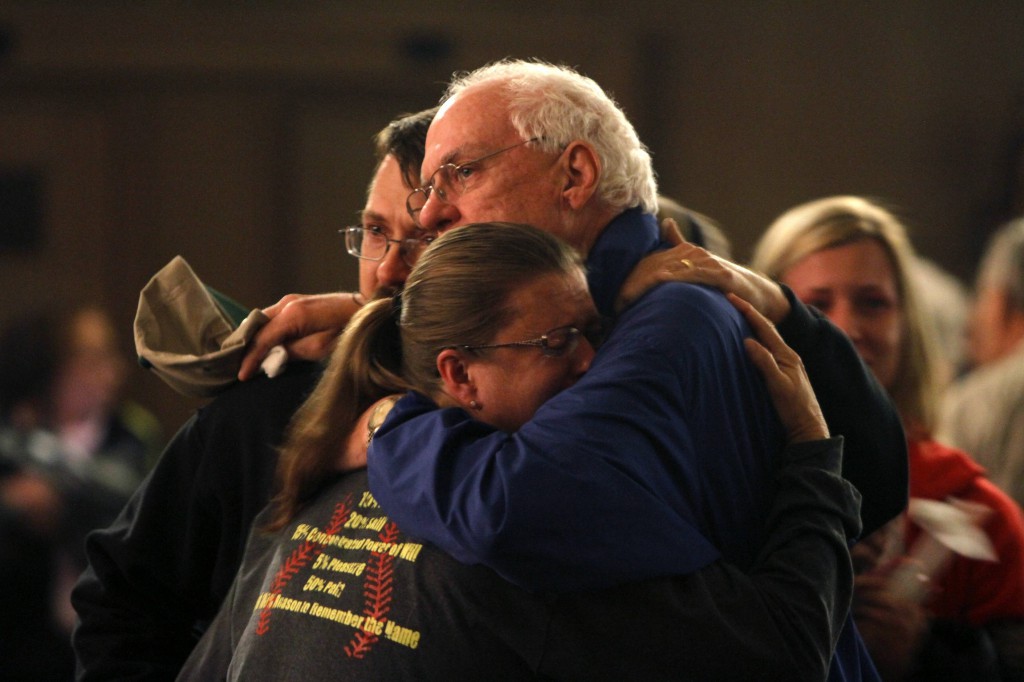
By Joan Kurkowski-Gillen
Father Ed Karasek was driving home from a meeting in Austin when reports of a massive explosion at a fertilizer plant in West came across the radio.
The tragedy’s human toll hit home quickly for the pastor of the Church of the Assumption in West. One of the first responders killed in the magnitude 2.1 blast was the son of parish secretary Carolyn Pustejovsky. Joey Pustejovsky was a volunteer firefighter and city secretary for the predominantly Czech-Catholic community located 20 miles north of Waco off Interstate 35.
West is in the Diocese of Austin, but borders the Diocese of Fort Worth.
About 200 others were injured in the industrial explosion the night of April 17 that followed a fire at the plant where volatile ammonium nitrate was used to manufacture fertilizer.
Texas Department of Public Safety spokesman Sgt. Jason Reyes said April 19 that 12 bodies had been recovered from debris and that 25 buildings remained to be cleared. He did not say whether that was likely to be the final death toll.
“This is just devastating,” said Father Karasek, who spent much of April 18 comforting grieving families. “We’ve lost parishioners and a lot of people lost homes. People are in shock.”
The explosion cut a six-block swath of destruction across the laid-back town of 2,800 known for its Czech bakeries, kolaches and annual Westfest Czech and Polka Festival each Labor Day weekend. Stained-glass windows inside Assumption Church, located about a mile from the site of the explosion, were broken but there was no other damage to the sanctuary or parish property.
Other churches in the northern part of the town were heavily damaged by the blast heard 50 miles away. Two public schools, a nursing home, and 50-unit apartment complex were among the buildings that were reduced to rubble.
During a Mass celebrated the morning after the explosion, Father Karasek tried to encourage devastated parishioners.
“The Lord will see us through this,” said the pastor in his homily. “We’re all grieving, but we can support each other.”
The parish was to host an interdenominational prayer service for the community April 19. Prayers and calls of concern continued to pour into the church office.
“We’ve gotten calls from Vatican Radio and Sky News,” said Father Karasek. “People from all over the country are offering their support and prayers and we really appreciate it.”
“It’s been a busy 18 hours for us,” admitted Deacon Denver Crawley, who serves several nearby parishes in the Fort Worth Diocese. “Two of our parishioners live inside the blast zone and we’ve been talking to them.”
Deacon Crawley told the North Texas Catholic, Fort Worth’s diocesan newspaper, that his friends were physically and spiritually fine but shaken.
He said the organist at Nativity of the Blessed Virgin Mary in Penelope “was blown from her living room into her kitchen. She was cut up with debris and glass but the injuries are minor.”
The Diocese of Austin was directing people who wished to donate to relief efforts to contact Catholic Charities of Central Texas and the Society of St. Vincent de Paul. Bishop Joe S. Vasquez asked parishes to hold second collections to support relief efforts.
Deacon Crawley described as “very Catholic” the area of small towns between Waco and Fort Worth settled by Czech immigrants in the 1850s. “The people are very close and they’re all family to one another.”
“They have a tremendous faith in God and a belief that he overcomes all evil and all sadness,” he added. “It’s our faith in the risen Christ that gets us through.”
Robert Nors, a director of the Catholic Union of Texas, a fraternal benefits society founded by Czech immigrants, called the explosion and its aftermath, “the worst thing to hit this area since the 1953 tornado in Waco.”
But, unlike a weather event that can be anticipated, the explosion was unexpected, he said.
“That made it worse,” said the Assumption parishioner, who lives two and a half miles from the destroyed plant. His house shook, he added.
Father Tom Kennedy, pastor of Holy Angels Church in Clifton, which is in the Diocese of Fort Worth, spent hours ministering to the injured arriving at Waco’s Hillsboro Medical Center, which received more than 100 injured people. Most had no idea what caused the explosion that sent them to a hospital, he said.
“They told me it was like the biggest sonic boom you’ve ever heard,” he remembered. “Then they showed me pictures of cars crushed like beer cans.”
The priest helped people contact relatives. At a Red Cross shelter in neighboring Abbott the following day, he delivered bottled water, blankets and messages returned on his phone by their family members.
Father Kennedy said that in the wake of a shocking, life-altering event, the best thing one can offer people is a calming presence. He said that knowing the area’s predominantly Catholic population would look to the church for help weighed heavily on his mind as he drove back roads toward the hospital, avoiding a clogged I-35. He found 40 people waiting for treatment when he arrived.
“At 1 and 2 o’clock in the morning there were nine or 10 different ministers from different churches there and we were all doing the same thing,” he recalled. “Just trying to console people. It was an incredible thing.”
Msgr. Stephen Berg, diocesan administrator of the Diocese of Fort Worth, offered prayers and support to the people of West and the Diocese of Austin in the wake of the explosion. Catholic Charities of Fort Worth will work with Catholic Charities of Austin to coordinate further assistance.
The Knights of Columbus in New Haven, Conn., announced April 18 it was accepting donations online at www.kofc.org/texas to help those in need and to supplement local efforts. The Knights of Columbus Council 2305 in West, Texas, also was working with local groups and the authorities to assist with disaster relief. – CNS